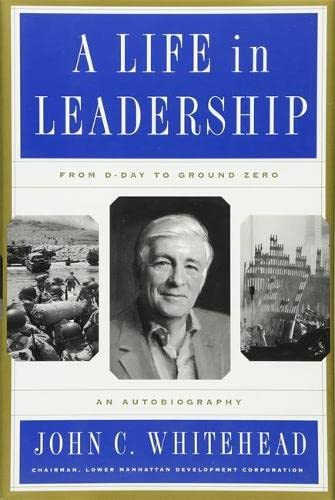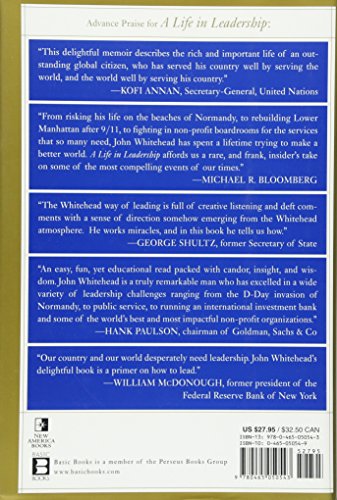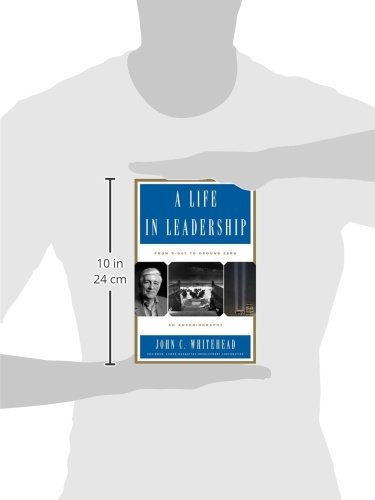Customer Services
Copyright © 2025 Desertcart Holdings Limited




A Life In Leadership: From D-Day to Ground Zero: An Autobiography
N**D
Elegant, Concise Autobiography
I found this autobiography very concisely written by a very humble man from modest origins who eventually rose to co-senior partner of Goldman Sachs, followed by his decision to leave banking and enter public service work. I particularly found the part where he discusses the bold changes he brought to Goldman Sachs most interesting (introducing "new businessmen" to "sell" investment banking services, internationalizing Goldman Sachs businesses, using accounting goals to motivate employees and improve performance, etc.) Overall, this is an excellent autobiography and gets the reader inside the head of major leader like Mr. Whitehead.
C**I
A Life of Leadership
This book is referenced in Sorkin's "Too Big Too Fail". It mentions this book is required reading for Goldman employees. It provides a good history of Goldman and some interesting insights into Reagan's leadership. Worth reading, easy to read and fun.CWSCleveland, Ohio
K**.
hero
this book is about a true american hero. he is outstanding as a human being, a business man, a world war ll veteran, a philanthropist...a man of outstanding character and commitment to doing the best for our country and anything he gets involved with.
T**B
Five Stars
OK
A**.
An Inspiring, Entertaining, and Thought-Provoking Book
This fascinating book will be of interest to a wide array of readers. Previously, I knew a little about John Whitehead's illustrious career of leadership in three sectors: as an icon of Wall Street, Deputy Secretary of State, and a philanthropist. Whitehead describes how his professional and personal goals were achieved. With humor and low-key modesty, he shares his experiences throughout his life, and admits to the cases of serendipity that marked aspects of his career.Readers interested in business and finance will enjoy reading how John Whitehead realized his vision of turning Goldman Sachs & Co. into a global investment banking powerhouse by the application of straight-forward methods. With determination, clear-thinking, good planning, and honesty, he rose at Goldman Sachs from a young Harvard MBA to co-chairman in the span of 29 years.Whitehead promoted innovations at Goldman Sachs that were later adopted throughout the investment banking industry: the first initial public offering, preferred stocks and convertible bonds. His nine-point memo with advice to the New Business Department was revolutionary at the time. It included the famous aphorism, "You can never learn anything when you're talking." The co-chairmanship of Goldman Sachs that he established with John Weinberg was a novel leadership solution, as no Wall Street firm had ever had two chairmen before. John Whitehead displayed determination and thoroughness in his work. For example, no one outside of privately-held Ford Motor Company knew exactly how big the company was. In the mid-1950s, Whitehead took the train up to Boston and personally went through the public records in the Commonwealth of Massachusetts files, to find a copy of Ford's balance sheet. This information stimulated Goldman Sachs to initiate a relationship with Ford, which culminated in its managing the IPO of the largest family-owned company in the world.For readers interested in foreign policy, the book illustrates how to achieve results inside the government. Even before his confirmation as Deputy Secretary of State under President Reagan, in the face of Senator Jesse Helms' obstructionism, he learned the value of speaking directly to an adversary in a successful effort to work things out. Whitehead wanted to make a difference in the world, which he accomplished "with just a little insight and persistence." One of his key successes was to begin the process of weaning Eastern Europe away from the Soviet Union through astute diplomacy, while US foreign policy was still focused on Moscow. He gives a riveting account of his meetings with Lech Walesa and Poland's president Jaruzelsky, Rumania's president Ceaucescu, and Bulgaria's dictator Zhivkov.John Whitehead also made a strong imprint in the world of nonprofits. "They appealed to the idealistic side of my nature," he writes. Over the course of his life, he has given away more than $100 million. His involvement in nonprofits began with assistance to freedom fighters resisting the Soviet invasion of Hungary in 1956. He describes his exciting experiences with US-supported mujahedin fighting Russian invaders in Afghanistan, including witnessing an attack on a Soviet fort led by a Harvard Law School graduate from Pakistan! More recently, Whitehead's chairmanship of numerous nonprofits - notably the International Rescue Committee, United Nations Association, Youth for Understanding, International House, and The Asia Society - coincided with their spectacular growth.What makes Whitehead's book especially appealing are the captivating details about his personal life. He relates how his dashing father would land his single-engine plane during World War I on an athletic field on the Bryn Mawr campus, to court his future wife. Upon graduating from high school, John Whitehead worked at the 1939 World's Fair running a concession guessing customers' weights. That summer, he earned enough to pay for his first year's tuition at Haverford College. When he joined the State Department, his daughter made up flash cards to help him memorize the capitals and the names of the political leaders of the 185 countries recognized by the United States.The book enters the new millennium with John Whitehead's tenure as chairman of the Lower Manhattan Development Corporation, to which he was appointed by Governor Pataki. Its mission was to rebuild the World Trade Center following the tragedy of 9-11. Whitehead describes the vision and challenges of rebuilding Ground Zero. The book concludes with his ideas about leadership, and comments about foreign policy and the general state of the nation. In Whitehead's model of "quiet leadership," the most effective leaders are patient, thoughtful people who are guided by high ideals and do a lot of listening. The ethical dimension of John Whitehead's life and leadership style, and his credo of "doing well while doing good," are truly inspiring - as is this book.
R**R
Full of Business Nuggets
I am about through with the book and I normally don't make comment until I'm done with a book, but this man is truly remarkable. The author has lived a remarkable business life and the book is an inspirational biography full of relatable business lessons or nuggets. I have had a lot of fun laughing and learning from his life lessons.On the other hand, I feel that the lesson I have learned most is that a balance of work and life is imperative to me. The author is twice divorced and I believe he dedicated more time to his work life than his family life. I think he is kinda reluctant to talk in more depth about it having only dedicated three pages to the topic. I think he would agree. Nonetheless, I have become a huge fan of John C. Whitehead.
Trustpilot
2 days ago
1 day ago